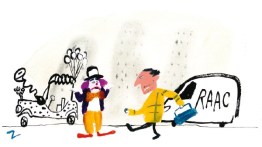Clear
‘OK, road’s clear ...Go!’

‘OK, road’s clear ...Go!’

Munch’s ohmigod!
‘It’s not back-firing properly.’

‘You start off wanting to be Tintin but end up as Captain Haddock...’
The morality of the A bomb Sir: In questioning whether we should celebrate VJ Day (Diary, 15 August), A.N. Wilson is confusing ‘why’ with ‘how’. The debate on the rights or wrongs of the nuclear attack will continue probably until long after the grandchildren of the last survivors have passed on. What should not be

Home Andrew Burnham described calls from Yvette Cooper, a rival candidate for the Labour leadership, for him to withdraw from the contest as ‘quite strange’. The problem was how to prevent Jeremy Corbyn, a left-winger, from being elected by the alternative vote system by 610,000 party members and registered supporters. Gordon Brown, the former disastrous

Over the past week, the government has finally made a decisive move to kickstart a fracking industry in Britain. Licences have been issued for shale gas exploration and the planning process streamlined so that in future, if local councils fail to make decisions within 16 weeks, the communities secretary will step in and adjudicate. It’s
No sex, please Several friends of the late Sir Edward Heath asserted that he could not be guilty of sexually assaulting children because he was asexual. How many adults do not experience sexual attraction? — A 2004 study by Anthony F. Bogaert, of Brock University, Ontario, Canada, analysed responses to a British questionnaire ten years

From ‘Education and the War’, The Spectator, 21 August 1915: War is a time in which a shortage of labourers can least be borne with. The land must not go untilled, the seed must not remain unsown, or the crops unharvested. Many of these services can be rendered by children whose schooling is not yet over.
Who would win the Labour leadership contest if it were decided by the number of Twitter followers? Jeremy Corbyn 94,200 Andy Burnham 85,400 Yvette Cooper 72,800 Liz Kendall 35,900 And the nascent Tory leadership battle? Boris Johnson 1.43m* George Osborne 135,000 Theresa May 0† *For @MayorofLondon; his personal handle has another 73,200. †She doesn’t tweet.

‘Now what did I come up here for?’


‘It’s Donald Trump who scares me.’

‘You need to see this.’

‘Oh for goodness sake, Colin! Nobody wants to see your work snaps!’


‘I got a great one of him complaining about people using camera phones.’


‘We need to put sandals on the ground.’